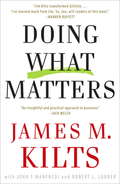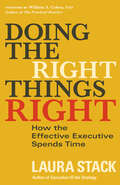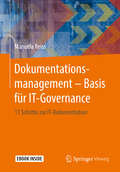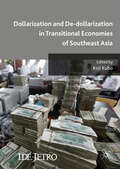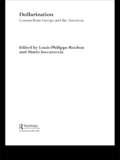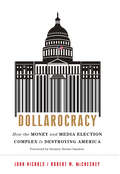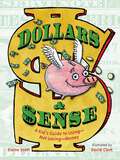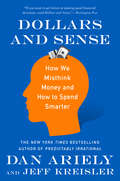- Table View
- List View
Doing What Matters: How to Get Results That Make a Difference -- The Revolutionary Old-school Approach
by James M. KiltsWhen Warren Buffett was asked why the Gillette board of directors chose Jim Kilts to be CEO, he said, "Jim made as much sense in terms of talking about business as anybody I've ever talked to. If you listen to Jim analyze a business situation you get absolutely no baloney. And, frankly, finding someone like that is a rarity." There is only one CEO in recent times who has faced--and succeeded at--the extraordinary challenges of leading three major companies--Gillette, Nabisco, and Kraft--into prosperous futures by doing what matters on the fundamentals. That CEO is Jim Kilts. In this vivid first-person account he reveals his system for success that is both cutting-edge and back-to-basics. Doing What Matters--the action plan for identifying and tackling what's important and ignoring the rest--is the key to winning in a warp-speed world where the need for revolutionary speed and decisiveness increases by the day. Kilts illustrates his ideas with colorful stories, such as "that little red razor." A new product idea he proposed early on at Gillette, it was initially shelved because "everyone knew you couldn't sell a red razor," but went on to become one of Gillette's biggest marketing successes ever. Jim Kilts's focus on both business fundamentals and personal attributes provides the "complete package," showing how to get results that make a difference through: * Intellectual integrity: The ability to face the unvarnished truth about yourself and your business and using what you see as the basis for action. * Generating emotional engagement and enthusiasm: Using the force of your personality and ideas to infuse people and an entire organization with a sense of purpose and mission. * Action: Gillette, with just five product lines, had over 20,000 SKUs. After studying the issue for over two years, there were still 20,000. How Kilts got Gillette off the dime to pare down the number to 7,000 almost overnight is an astonishing example of getting the rubber to meet the road--with enormous benefits to the business. * Understanding the right things through an overarching concept to frame and filter issues: For Jim Kilts it was Total Brand Value, the framework he used in the consumer products industry for achieving better, faster, and more complete results than the competition. Whether you're CEO of a multibillion-dollar global company, the brand manager for a product, an entrepreneur starting a small business, or just beginning a career, Doing What Matters provides the practical ideas that get results--ranging from a day one action plan for starting a new job to a chorus of cheers and support to a program of total innovation that involves everyone in changes from small to "big bang."
Doing Work Based Research: Approaches to Enquiry for Insider-Researchers
by Geoffrey C. Elliott Paul Gibbs Carol CostleyWith the growth of work based learning and practitioner research this book leads the way by addressing key issues faced by 'insider-researchers' - learners, practitioners and managers doing research projects in the organizations and communities in which they themselves work, or where they are already familiar with the setting.<P><P> The authors explore the implications of these research contexts, and discuss approaches and methodologies that work based researchers might adopt, with a particular focus on ethics - one of the key concerns for those undertaking a research project of this type.<P> This book is an authoritative and readable guide to the theory and practice of work based research. It is for anyone undertaking a research project based on work practice, including learners on postgraduate, undergraduate and doctoral programmes. Practitioners, managers and participants in work based courses or modules in education, healthcare and business management, will find it particularly useful.
Doing Your Business Research Project
by John BeechAvailable as an E-Inspection Copy! Go here to order Taking the fear out of writing your business project, this book helps you understand and carry out each step of the research process. With detailed, friendly and engaging support it takes you from the very beginning to the very end. Key features: Chapters are structured around FAQs such as 'How to choose a research question?', 'How do I go about a literature review?' guiding you towards a full understanding of the research process Workbook tasks help you shape your thoughts on each topic, enabling you to decide your own research question and how you will research it The importance of various ideas is clearly signposted, helping you prioritise your time according to your needs and goals. Templates and checklists from the book are also available for download at the Doing Your Business Research Project companion website at study.sagepub.com/beech This interactive guide is ideal for all Business and Management students about to complete a research project or dissertation.
Doing Your Dissertation in Business and Management: The Reality of Researching and Writing (SAGE Study Skills Series)
by Reva Berman BrownThis is a research book with a difference. It tells the truth about the research process. Each phase of a research project is addressed in the simultaneous order in which researchers often undertake them. Importantly, the book recognizes that writing up a research project is rarely organized in the form in which the dissertation is finally presented. Readers are given guidelines to help them assess the kind of researcher they are and the all important question of how to chose a research project is answered. The book is easy to read and covers: - An explanation of what lies behind the requirements that need to be met by a research proposal - What readers should expect from their supervisors and what the researched organisation might expect from readers - Support for the confused and anxious student This book will guide the student through a challenging time, giving quick and realistic support to enable a stress-free completion of their final dissertation and project write up.
Doing Your Literature Review: Traditional and Systematic Techniques
by Jill K. JessonThis highly accessible book guides students through the production of either a traditional or a systematic literature review, clearly explaining the difference between the two types of review, the advantages and disadvantages of both, and the skills needed. It gives practical advice on reading and organizing relevant literature and critically assessing the reviewed field. Contents include using libraries and the internet, note making, presentation, critical analysis, and referencing, plagiarism, and copyright.
Doing the Right Thing
by Theo Theobald Cary CooperA common metaphor for modern life is 'keep the plates spinning', but it is becoming increasingly hard to balance professional and private lives, and this takes its toll. The authors examine the working relationship between the organisation and employee, and establish new ways that managers can broker a better deal for all concerned.
Doing the Right Things Right: How the Effective Executive Spends Time
by Laura StackA How-To Guide for the Modern LeaderInspired by Peter Drucker's groundbreaking book The Effective Executive, Laura Stack details precisely how 21st-century leaders and managers can obtain profitable, productive results by managing the intersection of two critical values: effectiveness and efficiency.Effectiveness, Stack says, is identifying and achieving the best objectives for your organization—doing the right things. Efficiency is accomplishing them with the least amount of time, effort, and cost—doing things right. If you're not clear on both, you're wasting your time. As Drucker put it, "There is nothing so useless as doing efficiently that which should not be done at all." Stack's 3T Leadership offers twelve practices that will enable executives to be effective and efficient, grouped into three areas where leaders spend their time: Strategic Thinking, Teamwork, and Tactics. With her expert advice, you'll get scores of new ideas on how you, your team, and your organization can boost productivity.
Dokumentationsmanagement – Basis für IT-Governance
by Manuela ReissIm Buch erfahren Sie nicht nur, warum IT-Dokumentation ein wichtiges Managementwerkzeug ist, sondern auch, wie Sie dieses Werkzeug Schritt für Schritt einrichten und pflegen. Im Fokus steht das von der Autorin entwickelte und in der Praxis erprobte Vorgehensmodell zum Aufbau einer ganzheitlichen und managementorientierten IT-Dokumentation zur Unterstützung von IT-Governance. Mit seinem Glossar leistet das Buch darüber hinaus einen Beitrag zur Standardisierung der Begriffe, die im Umfeld des Themas Dokumentation verwendet werden. Damit richtet sich das Buch an alle, die sich wissenschaftlich fundiert mit der praktischen Umsetzung der IT-Dokumentation auseinandersetzen möchten.
Dollar Dominance: Why It Rules the Global Economy and How to Challenge It
by Photis LysandrouIn a world shaken by crises, why does the dollar continue to dominate? In this book, Photis Lysandrou explores the interaction between global instability and the enduring strength of the dollar. Drawing on examples from the 2008 Great Financial Crisis to the COVID-19 pandemic and Russia's invasion of Ukraine, the author reveals how uncertainty and instability in global trade, production and politics drives investors towards the safety of the dollar, reinforcing its dominance over other currencies. With clear and insightful analysis, Lysandrou reveals the true global financial foundations of dollar dominance, and lays out what it would take for other currencies such as the Euro to challenge its position.
Dollar General (A)
by Stephen P. Kaufman Willy Shih Rebecca McKillicanDollar General Corporation (DG) operates one of the leading chains of extreme value retailers in the United States. 2006 revenues reached $9.2 billion, making DG the 6th largest mass retailer in the country. With revenues growing at 9% annually over the five-year period up to 2005, DG had the distinction of being only one of three retailers to outperform Wal-Mart in both revenue and profit growth in that time. Life in a Dollar General store paints a vivid picture of the roots and historical focus of the company. Opportunistic buying has given the stores an eclectic merchandise mix. Analysts often referred to this category as "treasure hunt" SKUs. Offers an opportunity to examine a company's business model, particularly since DG has been so successful competing with Wal-Mart where so many other retailers have not. While it started out as a family business in the five-and-dime tradition, it evolved to a close-out retail model where its unique low-overhead operations were advantageous. As it added highly consumable categories its mix shifted, but it managed to retain its low-overhead model. Interestingly, the mix shift was likely more an emergency strategy driven by store level operations than by top-down driven strategy. Frames the growth options available to DG's CEO as he grapples with how to maintain growth.
Dollar General (A)
by Stephen P. Kaufman Willy Shih Rebecca MckillicanDollar General Corporation (DG) operates one of the leading chains of extreme value retailers in the United States. 2006 revenues reached $9.2 billion, making DG the 6th largest mass retailer in the country. With revenues growing at 9% annually over the five-year period up to 2005, DG had the distinction of being only one of three retailers to outperform Wal-Mart in both revenue and profit growth in that time. Life in a Dollar General store paints a vivid picture of the roots and historical focus of the company. Opportunistic buying has given the stores an eclectic merchandise mix. Analysts often referred to this category as "treasure hunt" SKUs. Offers an opportunity to examine a company's business model, particularly since DG has been so successful competing with Wal-Mart where so many other retailers have not. While it started out as a family business in the five-and-dime tradition, it evolved to a close-out retail model where its unique low-overhead operations were advantageous. As it added highly consumable categories its mix shifted, but it managed to retain its low-overhead model. Interestingly, the mix shift was likely more an emergency strategy driven by store level operations than by top-down driven strategy. Frames the growth options available to DG's CEO as he grapples with how to maintain growth.
Dollar General Bids for Family Dollar
by David Lane Suraj Srinivasan Jonas Heese Paula A. PriceIn spring 2015, Dollar General's CEO Rick Dreiling was looking ahead to retiring at year's end but worried about ensuring continued growth for the company he had built since 2008 into a market leader in the U.S. discount retail world. Dollar General operated over 11,500 stores in 40 states at the start of 2015, but had recently been rebuffed in a tender offer for its leading rival, Family Dollar. Though Dollar General had held talks with Family Dollar as early as 2013, Family Dollar shareholders chose to ignore Dollar General's more lucrative tender offer and the urging of several activist investors and sold their firm to the smaller Dollar Tree chain. Dreiling could not help but revisit some of the key decisions he and the rest of the board had made in their pursuit of Family Dollar. From a governance perspective, he was confident that the Dollar General board had fulfilled its duty to shareholders during the bidding process despite Family Dollar's decision to sell to Dollar Tree. From a strategic perspective, he wondered whether Family Dollar had been the right competitor to buy.
Dollar General Going Private
by Sharon KatzThe 'Dollar General Going Private' case is intended to improve students' understanding and encourage their use of financial statement analysis. The context is Dollar General Corporation's acquisition by private equity sponsor KKR, which took the company private in 2007. Although the proposed merger generated a 30% premium over the stock price at the time, and the enterprise value to EBITDA multiple was significantly higher than comparable transaction multiples in the retail industry, some shareholders claimed that the price was "grossly inadequate," making the decision whether to approve the transaction a difficult one for shareholders generally.
Dollar Tree: Breaking the Buck
by Jill Avery Marco BertiniFor thirty-five years, Dollar Tree, a discount retail chain selling general merchandise, had held it fixed price point steady, pricing all of its household items, food, stationery, books, seasonal items, gifts, toys, and clothing that made up its diverse and ever-changing assortment at $1.00. While all other dollar store chains had raised prices over the years to keep up with inflation, Dollar Tree had never budged on its price. However, in late 2021 the company announced that Dollar Tree was "breaking the buck" and raising prices on all goods to $1.25. Would the demise of the $1.00 price point bring about the downfall of Dollar Tree or could the retail chain weather its price change without alienating its price sensitive shoppers through smart marketing, pricing, and branding strategies?
Dollarama Inc.
by Andre F. PeroldDollarama is the leading operator of dollar stores in Canada. The firm performed extraordinarily well after a leveraged buyout in 2004, and recently executed a highly successful IPO. The company sources its goods primarily from Asia. It has strong brand recognition and competitive advantages in operations, purchasing, and merchandising. In the face of margin pressures, Dollarama recently took the risky decision to move from the single one dollar price point to multiple price points. The additional price points offer some flexibility, but customers' appetite for purchasing products priced above $1 has yet to be fully determined. Dollarama is on a fast growth track but remains chiefly concerned about its vulnerability to supply disruptions and to increases in merchandise costs from higher input prices. The firm appears quite overvalued based on a multiples analysis, but considerably undervalued based on a discounted cash flow analysis.
Dollarization and De-dollarization in Transitional Economies of Southeast Asia
by Koji KuboThis book sheds light on the dollarization trends of four transitional economies in Southeast Asia: Cambodia, Lao PDR, Myanmar, and Vietnam. Moving beyond the tendency to focus on the Latin American experience of dollarization and prolonged high inflation, the chapters in this book compare how payment dollarization has been more persistent than other types of dollarization in this region due to network externalities. The book illustrates that dollarization started in the underdeveloped financial system in these countries and that dollarization interacted with financial development, which is in contrast to dollarization in Latin America. This project extends the frontiers of empirical studies on dollarization. It will be of interest to students, researchers and policy makers concerned with dollarization and economics in Southeast Asia.
Dollarization and Maturity Structure of Public Securities: The Experience of Bolivia
by Esteban Vesperoni Walter OrellanaA report from the International Monetary Fund.
Dollarization: Lessons from Europe for the Americas (Routledge International Studies In Money And Banking Ser. #No.22)
by Louis-Philippe Rochon Mario SeccarecciaThe use of the US dollar for domestic monetary transactions outside the USA has gone on for many years now - Panama in 1904 being the earliest example. Since the advent of the Euro, the debate over the benefits of monetary integration has warmed up - particularly for NAFTA countries.This collection, with contributions from experts such as Philip Ar
Dollarocracy: How the Money and Media Election Complex is Destroying America
by Robert W. Mcchesney John NicholsFresh from the first $10 billion election campaign, two award-winning authors show how unbridled campaign spending defines our politics and, failing a dramatic intervention, signals the end of our democracy.Blending vivid reporting from the 2012 campaign trail and deep perspective from decades covering American and international media and politics, political journalist John Nichols and media critic Robert W. McChesney explain how US elections are becoming controlled, predictable enterprises that are managed by a new class of consultants who wield millions of dollars and define our politics as never before. As the money gets bigger-especially after the Citizens United ruling-and journalism, a core check and balance on the government, declines, American citizens are in danger of becoming less informed and more open to manipulation. With groundbreaking behind-the-scenes reporting and staggering new research on "the money power," Dollarocracy shows that this new power does not just endanger electoral politics; it is a challenge to the DNA of American democracy itself.
Dollars & Sense: A Kid's Guide to Using--Not Losing--Money
by Elaine ScottWe&’re in the money! Many things come with instructions. Unfortunately, money isn&’t one of them. Most people learn how to use it—or lose it—by trial and error. Dollars & Sense is a basic operating instruction manual for money that will teach readers about the history of money, the way our American economy works, and how to make important decisions about personal finance. From skulls, sheep, and shells as barter in ancient civilizations to credit, interest, and collateral of our modern day economics, money—and all its glorious uses and cantankerous troubles—is explained in this concise and entertaining volume. Learn about how to make money, how to budget your money, how the government manages (or mismanages!) money, and how to be rich without even trying. Money is sometimes your friend and sometimes your enemy, but in this day and age, we all have to learn to get along with it. An engaging and approachable guide for kids tackling how to responsibly manage their money. Included are sidebars, time lines, diagrams, a glossary, and further resources, as well as information on related topics such as the Great Recession and sequestration.
Dollars and Borders: U.S. Governemnt Attempts to Restrict Capital Flows, 1960-1980 (Routledge Revivals)
by James P. HawleyOriginally published in 1987, Dollars and Borders explores the United States’ government’s relation to transnational capital. James P. Hawley traces the attempts of four presidents (John F. Kennedy, Lyndon B. Johnson, Richard Nixon, and Jimmy Carter) in the 1960s and 1970s to restrict international movements of U.S. capital and analyses the political and economic issues confronted by the government during this period. This title will be of particular interest to students of Politics and Economics.
Dollars and Dominion: US Bankers and the Making of a Superpower
by Professor Mary BridgesHow the creation of a new banking infrastructure in the early twentieth century established the United States as a global financial powerThe dominance of US multinational businesses today can seem at first like an inevitable byproduct of the nation&’s superpower status. In Dollars and Dominion, Mary Bridges tells a different origin story. She explores the ramshackle beginnings of US financial power overseas, showing that US bankers in the early twentieth century depended on the US government, European know-how, and last-minute improvisation to sustain their work abroad. Bridges focuses on an underappreciated piece of the nation&’s financial infrastructure—the overseas branch bank—as a brick-and-mortar foundation for expanding US commercial influence.Bridges explores how bankers sorted their new communities into &“us&”—potential clients—and &“them&”—local populations, who often existed on the periphery of the banking world. She argues that US bankers mapped their new communities by creating foreign credit information—and by using a financial asset newly enabled by the Federal Reserve System, the bankers&’ acceptance, in the process. In doing so, they constructed a new architecture of US trade finance that relied on long-standing inequalities and hierarchies of privilege. Thus, racialized, class-based, and gendered ideas became baked into the financial infrastructure.Contrary to conventional wisdom, there was nothing inevitable or natural about the rise of US finance capitalism. Bridges shows that US foreign banking was a bootstrapped project that began as a side hustle of Gilded Age tycoons and sustained itself by relying on the power of the US state, copying the example of British foreign bankers, and building alliances with local elites. In this way, US bankers constructed a flexible and durable new infrastructure to support the nation&’s growing global power.
Dollars and Sense: Developing Good Money Habits (Slim Goodbody's Life Skills 101)
by John BursteinSlim Goodbody provides children with the fundamentals of money-including intrinsic value, and how to save and spend wisely. Money and the way people deal with it, affects almost every aspect of life-from purchasing healthy foods to buying running shoes.
Dollars and Sense: How We Misthink Money and How to Spend Smarter
by Jeff Kreisler Dr Dan ArielyWhy is paying for things painful?Why are we comfortable overpaying for something in the present just because we’ve overpaid for it in the past?Why is it easy to pay $4 for a soda on vacation, when we wouldn’t spend more than $1 on that same soda at our local grocery store?We think of money as numbers, values, and amounts, but when it comes down to it, when we actually use our money, we engage our hearts more than our heads. Emotions play a powerful role in shaping our financial behavior, often making us our own worst enemies as we try to save, access value, and spend responsibly. In Dollars and Sense, bestselling author and behavioral economist Dan Ariely teams up with financial comedian and writer Jeff Kreisler to challenge many of our most basic assumptions about the precarious relationship between our brains and our money. In doing so, they undermine many of personal finance’s most sacred beliefs and explain how we can override some of our own instincts to make better financial choices.Exploring a wide range of everyday topics—from the lure of pain-free spending with credit cards to the pitfalls of household budgeting to the seductive power of holiday sales—Ariely and Kreisler demonstrate how our misplaced confidence in our spending habits frequently leads us astray, costing us more than we realize, whether it’s the real value of the time we spend driving forty-five minutes to save $10 or our inability to properly assess what the things we buy are actually worth. Together Ariely and Kreisler reveal the emotional forces working against us and how we can counteract them. Mixing case studies and anecdotes with concrete advice and lessons, they cut through the unconscious fears and desires driving our worst financial instincts and teach us how to improve our money habits.The result not only reveals the rationale behind our most head-scratching financial choices but also offers clear guidance for navigating the treacherous financial landscape of the brain. Fascinating, engaging, funny, and essential, Dollars and Sense provides the practical tools we need to understand and improve our financial choices, save and spend smarter, and ultimately live better.
Dollars and Sex: How Economics Influences Sex and Love
by Marina AdshadeLike Freakonomics, Dollars and Sex takes economics and converts it into a sexy science by applying the principles of supply and demand, and other market forces, to matters of love, courtship, sex, and marriage. As she does in her hugely popular blog, author Marina Adshade explores the marketplace for sex and love using research, economic analysis, and humor to reveal just how central the interplay of libido, gender, love, power, and economic forces is to the most important choices we make in our lives. Call it "Sexonomics."
